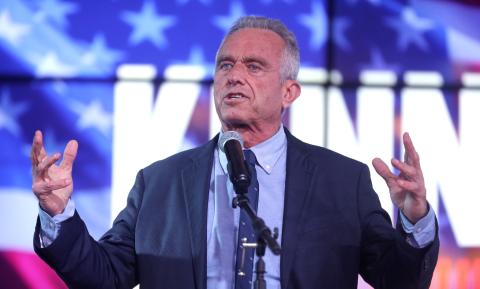Photo Credit Gage Skidmore / Flickr
For the first time in decades, an independent presidential candidate has caught up to one of the two establishment parties in a statewide poll.
To no one's surprise, a recent HarrisX poll shows former President Donald Trump with a commanding lead in Utah. However, President Biden is no longer sitting at second by himself.
The poll results show Biden and Robert F. Kennedy Jr tied at 20% in the Beehive State. This marks the first time an independent candidate has had this type of showing since Ross Perot in the 90s.
"Nationally, Kennedy consistently has the highest favorability among the three major candidates," the Kennedy campaign states.
"He also outpaces Presidents Biden and Trump among independents, who constitute the largest political bloc in the country with 45% of U.S. adults. Only 27% identify as Republicans and 25% as Democrats."
The campaign points out that Biden trails Trump in 6 out of 7 swing states -- Arizona, Georgia, Nevada, North Carolina, Pennsylvania, and Wisconsin -- and is tied with Trump in Michigan.
Over the last couple of months, Kennedy's team has used polling data to argue that if there is a spoiler in the election, it is not him, but the incumbent president.
They point to a 50-state poll of more than 26,000 voters released in May that shows Kennedy beating both Biden and Trump in one-on-one contests -- and against Biden it wouldn't even be close.
The campaign commissioned the poll from John Zogby Strategies, which remains one of the only polling agencies to gauge how well Kennedy would do in head-to-head matchups against the major party candidates.
While polling data has increasingly shown to be an -- at best -- inconsistent way to show the state of a presidential election, it is still heavily relied on as a tool to shape perception.
This is why the only head-to-head contest polling groups and websites that publish polling averages, like RealClearPolitics, show is between the Republican and the Democrat.
Polling is also a tool the two major parties have used to keep independent and third-party candidates off the debate stage. The perception has to be that voters only have two options.
LEARN MORE: Everything You Need to Know About the Commission on Presidential Debates
But this, too, may change in 2024.
The Trump and Biden camps agreed to ditch the Commission on Presidential Debates in favor of debates that would solely be sponsored by national news companies, like CNN and ABC.
CNN was the first to extend an invite to both campaigns, and the network worked with them on all the details, including rules that would ensure the debate was between Trump and Biden only.
In fact, the Washington Post wrote a detailed description of a conversation between the Trump team and a CNN producer in which the producer promised "RFK will not be on the stage."
It appears all parties involved were on the same page from the start as CNN's invite was sent, accepted, and the rules were established in a matter of hours.
This type of collusion, however, is illegal and Kennedy filed a complaint with the FEC pointing out ways in which CNN and the major party campaigns violated the Federal Election Campaign Act.
One of the major sticking points was the ballot access criteria.
CNN's debate criteria states that in order to appear on the debate stage “a candidate's name must appear on a sufficient number of state ballots to reach the 270 electoral vote threshold.”
While the Kennedy campaign asserts that it has submitted the needed signatures to get him close to this threshold, many states have not certified his name for the ballot -- therefore CNN wouldn't count them.
However, the network made an exception for Trump and Biden. Neither candidate have officially been declared their respective party's nominee, so neither of them appear on any ballot at this point.
The Republican and Democratic Parties do not officially choose their nominees until their conventions, the first of which is the GOP convention in mid-July.
The CNN debate is scheduled for June 27.
CNN claimed the candidates meet the criteria because they are the "presumptive nominee," which assumes they will be on the ballot -- an assumption not extended to any other candidate.
Kennedy asserted that this was not “pre-established” and “objective” criteria to determine debate eligibility and therefore violated federal law. And the FEC agreed.
The agency stated that the phrase "presumptive nominee" "is not in the FEC's debate regulation." This means CNN would not be exempt from prohibitions on excessive campaign contributions.
The FEC did not comment further since there was an open complaint made by the Kennedy campaign.
The irony is Biden and Trump specifically wanted to keep Kennedy off the stage, and they decided to abandon the one group that has successfully kept a third candidate off the debate stage for 7 consecutive presidential election cycles.
Even when the Commission on Presidential Debates was guilty of the same type of collusion, they were shielded by the indifference of the FEC -- protection CNN is not receiving.
"To come into compliance, CNN must apply its criteria objectively," the Kennedy campaign asserts.
"Presidents Biden and Trump have not yet been nominated by their parties and their names are not certified to appear on a single state ballot."
His team points out that Kennedy, in contrast, has been certified to appear on the ballot in 7 states so far, including California, Delaware, Hawaii, Michigan, Oklahoma, South Carolina, and Utah.
"Objectively applying CNN’s criteria requires, at a minimum, that it admit Kennedy into the debate as he is the candidate that is furthest along in complying with CNN’s debate criteria," the campaign argues.
As of this article's publication, CNN has made no changes to its lineup. The deadline to qualify for the June 27 debate is Thursday, June 20, but what actions will be taken if Kennedy is not included remain unknown.
